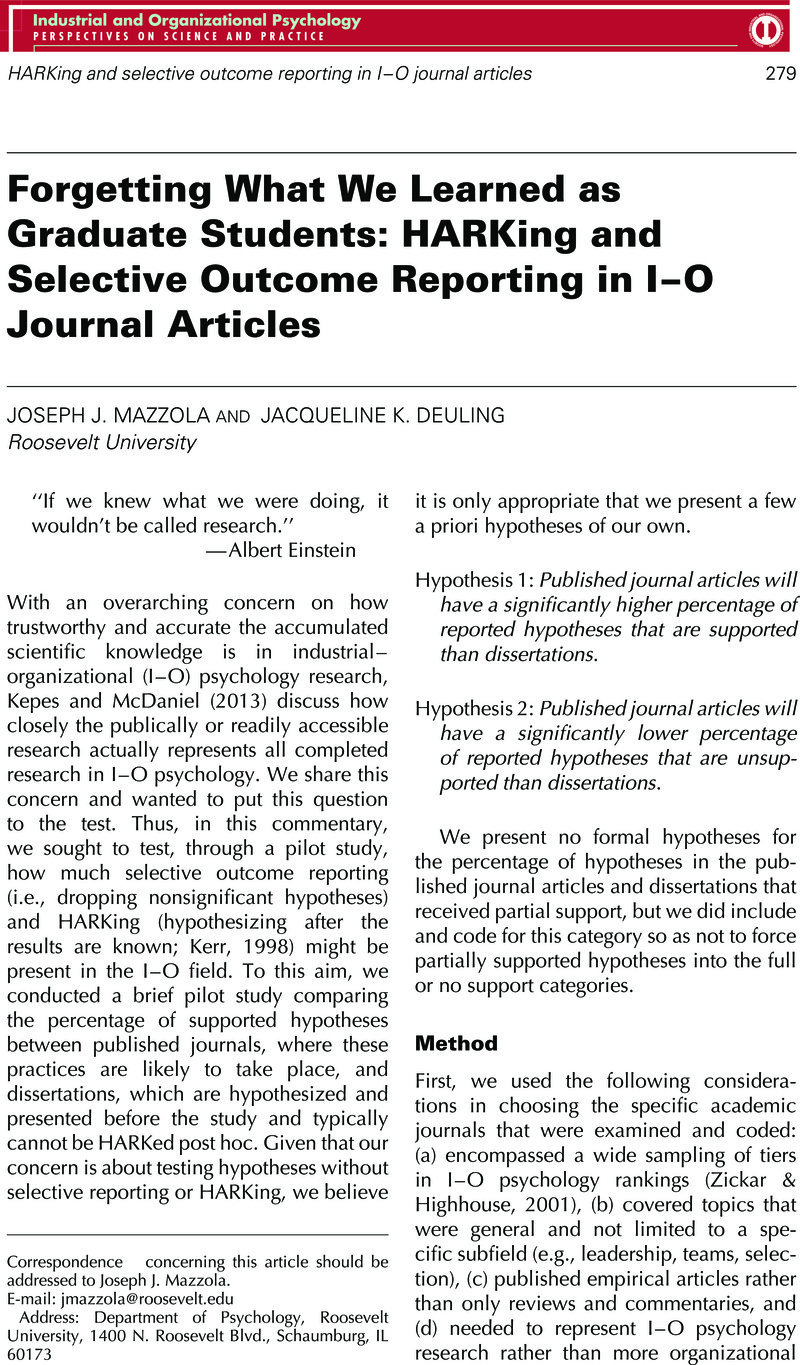Crossref Citations
This article has been cited by the following publications. This list is generated based on data provided by Crossref.
H. Starbuck, William
2013.
Why and where do academics publish?.
M@n@gement,
Vol. 16,
Issue. 5,
p.
707.
Starbuck, William H.
2015.
Incentives and Performance.
p.
3.
Kendall, Dana L
and
Campanario, Scott C
2016.
Honoring God through scientific research: Navigating the ethics of publishing with our students.
International Journal of Christianity & Education,
Vol. 20,
Issue. 2,
p.
133.
Banks, George C.
O’Boyle, Ernest H.
Pollack, Jeffrey M.
White, Charles D.
Batchelor, John H.
Whelpley, Christopher E.
Abston, Kristie A.
Bennett, Andrew A.
and
Adkins, Cheryl L.
2016.
Questions About Questionable Research Practices in the Field of Management.
Journal of Management,
Vol. 42,
Issue. 1,
p.
5.
Banks, George C.
Rogelberg, Steven G.
Woznyj, Haley M.
Landis, Ronald S.
and
Rupp, Deborah E.
2016.
Editorial: Evidence on Questionable Research Practices: The Good, the Bad, and the Ugly.
Journal of Business and Psychology,
Vol. 31,
Issue. 3,
p.
323.
Schwab, Andreas
and
Starbuck, William H.
2016.
A Call for Openness in Research Reporting: How to Turn Covert Practices into Helpful Tools.
SSRN Electronic Journal ,
Starbuck, William H.
2016.
60th Anniversary Essay.
Administrative Science Quarterly,
Vol. 61,
Issue. 2,
p.
165.
Cook, Bryan G.
2016.
Reforms in Academic Publishing: Should Behavioral Disorders and Special Education Journals Embrace Them?.
Behavioral Disorders,
Vol. 41,
Issue. 3,
p.
161.
Spector, Paul E.
and
Pindek, Shani
2016.
The Future of Research Methods in Work and Occupational Health Psychology.
Applied Psychology,
Vol. 65,
Issue. 2,
p.
412.
Mayrhofer, Mira
2017.
The International Encyclopedia of Communication Research Methods.
p.
1.
Schwab, Andreas
and
Starbuck, William H.
2017.
A Call for Openness in Research Reporting: How to Turn Covert Practices Into Helpful Tools.
Academy of Management Learning & Education,
Vol. 16,
Issue. 1,
p.
125.
Rubin, Mark
2017.
When Does HARKing Hurt? Identifying When Different Types of Undisclosed Post Hoc Hypothesizing Harm Scientific Progress.
Review of General Psychology,
Vol. 21,
Issue. 4,
p.
308.
Woznyj, Haley M.
Grenier, Kelcie
Ross, Roxanne
Banks, George C.
and
Rogelberg, Steven G.
2018.
Results-blind review: a masked crusader for science.
European Journal of Work and Organizational Psychology,
Vol. 27,
Issue. 5,
p.
561.
Luke, Timothy J.
2019.
Lessons From Pinocchio: Cues to Deception May Be Highly Exaggerated.
Perspectives on Psychological Science,
Vol. 14,
Issue. 4,
p.
646.
Efendic, Emir
and
Van Zyl, Llewellyn E.
2019.
On reproducibility and replicability: Arguing for open science practices and methodological improvements at the South African Journal of Industrial Psychology.
SA Journal of Industrial Psychology,
Vol. 45,
Issue. ,
Stricker, Johannes
and
Günther, Armin
2019.
Scientific Misconduct in Psychology.
Zeitschrift für Psychologie,
Vol. 227,
Issue. 1,
p.
53.
Crede, Marcus
and
Harms, Peter
2019.
Questionable research practices when using confirmatory factor analysis.
Journal of Managerial Psychology,
Vol. 34,
Issue. 1,
p.
18.
Prosperi, Mattia
Bian, Jiang
Buchan, Iain E.
Koopman, James S.
Sperrin, Matthew
and
Wang, Mo
2019.
Raiders of the lost HARK: a reproducible inference framework for big data science.
Palgrave Communications,
Vol. 5,
Issue. 1,
Hensel, Przemysław G
and
Guérard, Stéphane
2020.
The institutional consequences of decoupling exposure.
Strategic Organization,
Vol. 18,
Issue. 3,
p.
407.
Hare, Alexander J.
Newman, Amy E.M.
Dantzer, Ben
Lane, Jeffrey E.
Boutin, Stan
Coltman, David W.
and
McAdam, Andrew G.
2021.
An independent experiment does not support stress-mediated kin discrimination through red squirrel vocalizations.
Animal Behaviour,
Vol. 176,
Issue. ,
p.
185.



